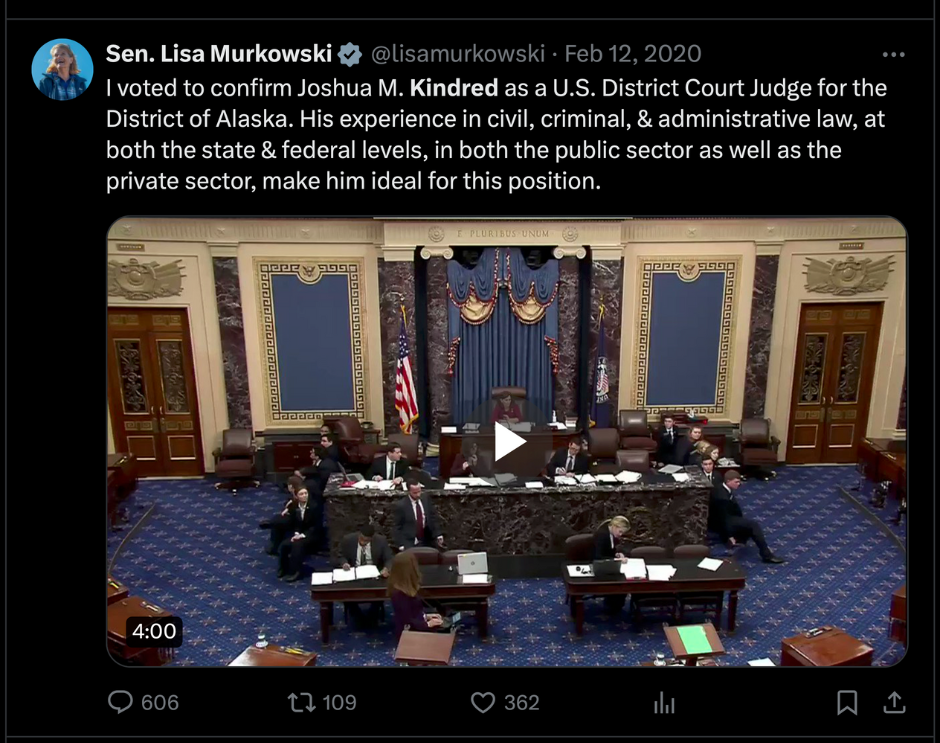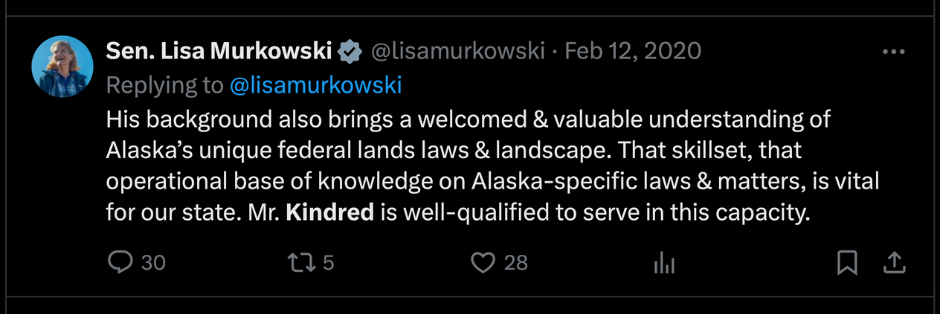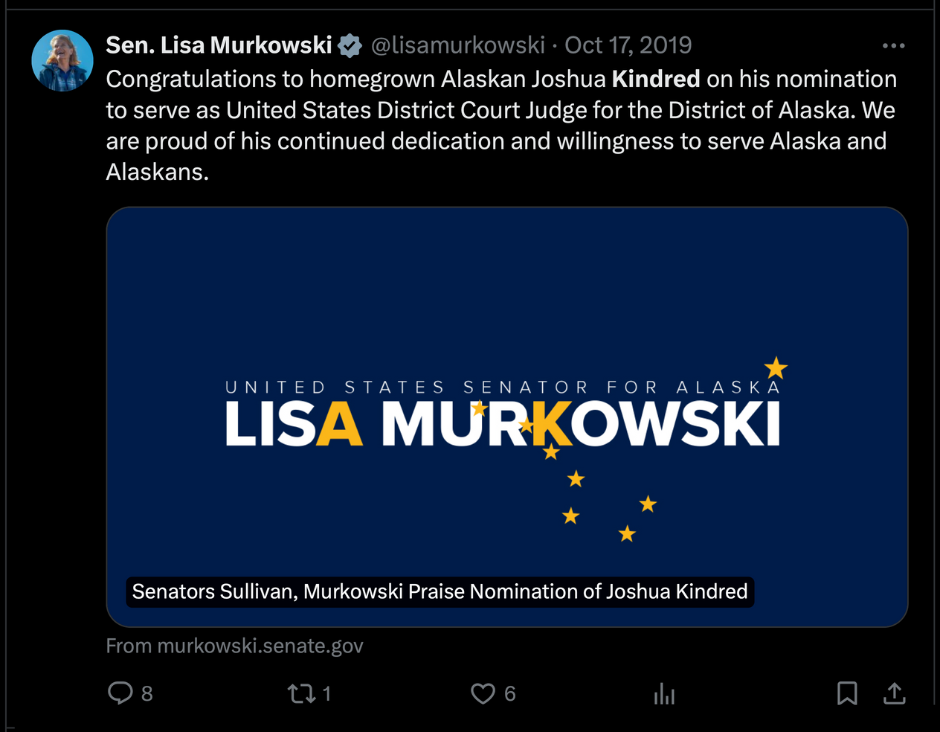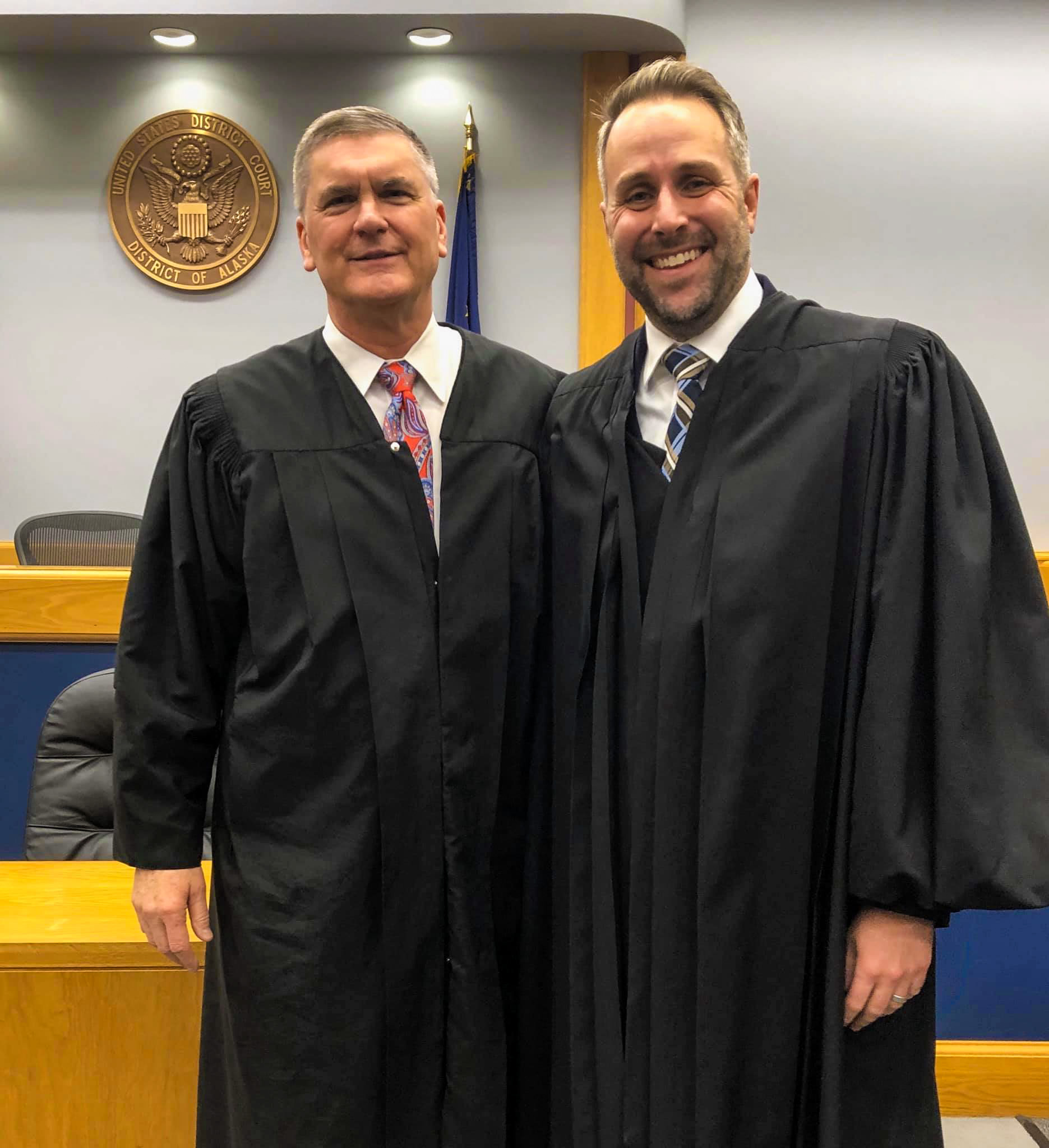Indianz.Com > News > Federal judge resigns in Alaska following investigation into misconduct

Federal judge resigns in Alaska following investigation into misconduct
Republican leader on Senate Committee on Indian Affairs scrubs social media of support for disgraced figure
Tuesday, July 9, 2024
Indianz.Com
A federal judge who was once praised for his work in understanding Native issues — including the crisis of violence against Native women — has resigned following an investigation into sexual misconduct.
U.S. District Judge Joshua M. Kindred of the District of Alaska resigned, effective Monday, the 9th Circuit Court of Appeals announced in a news release. The investigation determined that he created a hostile work environment, engaged in an “inappropriately sexualized relationship with one of his law clerks” and lied about the relationship when asked about it.
“The Judiciary is entrusted to self-govern and, in doing so, must hold its federal judges to the
highest standards of integrity and impartiality. We take judicial misconduct complaints seriously,” Chief Circuit Judge Mary H. Murguia said in the release.
The 9th Circuit’s announcement was accompanied by a 30-page order and certification that substantiated the sexual relationship with the former judge’s law clerk despite the lies about it. However, in recommending that Kindred face impeachment proceedings, the court did not focus on his treatment of the subordinate employee or the “unwanted, offensive, and abusive conduct” he engaged in with other employees.
Instead, the judicial council for the appellate court that hears a significant number of Indian law cases from several Western states suggested that making false statements could be considered “high Crimes and Misdemeanors” under the U.S. Constitution, and thus grounds for Kindred’s removal from the bench.
“The false statements that Judge Kindred has made throughout these proceedings, along with the severity of Judge Kindred’s misconduct, may constitute one or more grounds for impeachment,” the document stated.
But since Kindred voluntarily resigned through a letter dated July 3, impeachment proceedings won’t be needed to remove him from the court. His departure leaves a void that Alaska’s two U.S. Senators pledged to address.
“Judges need to be held to the highest of standards and Mr. Kindred fell well short of that mark. I will be working quickly to advance a replacement nominee for consideration,” Sen. Lisa Murkowski (R-Alaska), who serves as vice chair of the Senate Committee on Indian Affairs, said in a post on social media on Monday evening, Eastern time. Sen. Dan Sullivan (R-Alaska) also reacted on social media, referring to Kindred’s misconduct as “extremely disappointing.” He said he would look for a replacement judge who will “interpret the law as Congress intended, not as special interest groups and unelected federal bureaucrats want it to be.” What Murkowski and Sullivan left out of their statements was their support for Kindred, who was nominated to the bench by Republican former president Donald Trump. Both spoke highly of the disgraced judge and praised his longtime connections to Alaska, which they said would help him handle legal matters in their home state. In a speech on the floor of the U.S. Senate, Murkowski noted that Kindred had been working as a regional solicitor at the Department of the Interior, the federal agency with the most trust and treaty responsibilities in Indian Country, when he was nominated. She described him as “truly knowledgeable” about the Alaska Native Claims Settlement Act and other Alaska-specific laws that impact Native subsistence, an issue still of considerable debate in the federal courts. “He comes from good family,” Murkowski said on February 11, 2020, as the Senate was moving forward along party lines to advance Kindred’s nomination. “He married into good family. He is a good Alaskan. He knows Alaska. He understands our state well.”Based on the Judicial Council of the Ninth Circuit’s Order and Certification, it is more than appropriate that Mr. Kindred tendered his resignation. Judges need to be held to the highest of standards and Mr. Kindred fell well short of that mark. I will be working quickly to…
— Sen. Lisa Murkowski (@lisamurkowski) July 8, 2024
Two months earlier, Sullivan likewise made references to “family” as he introduced Kindred at a nomination hearing before the Senate Committee on the Judiciary. He praised the Republican pick for addressing “heinous crimes of sexual violence against women” as a criminal prosecutor in Anchorage, the largest municipality in Alaska, and one that is considered a hub for the Native community. He also said Kindred engaged in legal pro bono work that was “focused on combating sexual abuse and domestic violence” in a state where Native women are victimized at disproportionate rates. “He is committed to honoring Congress’s commitments to Alaska’s first peoples,” Sullivan said on December 4, 2019. “He’s committed to equal justice under the law and will serve with honor and distinction on the federal court in Alaska.” Once word of Kindred’s resignation became news, social media users started leaving negative replies on Murkowski’s Monday evening statement and on an earlier thread in which the Republican from Alaska explained why she voted in favor of his confirmation as a federal judge. The February 12, 2020, posts — there were three total — included video from her speech on the Senate floor a day prior. But sometime in the early afternoon on Tuesday, Eastern time, the posts praising Kindred were deleted from @lisamurkowski, Murkowski’s official Senate account on X, formerly known as Twitter, with the Apple version of the social media app displaying a “This post has been deleted” message. Screenshots of three posts from the February 2020 thread were created by Indianz.Com before they were removed, along with a screenshot of an October 17, 2019, post in praise of Kindred that also has gone missing. An archive of the thread on Wayback Machine shows Murkowski’s original remarks from 2020, including some of the newer negative comments. Likewise, an October 16, 2019, press release in support of Kindred has been deleted from murkowski.senate.gov Meanwhile, a video on the Republican lawmaker’s YouTube channel about Kindred remains online as of Tuesday afternoon.I had the opportunity to introduce Alaskan Josh Kindred at a hearing of the @SenJudiciary yesterday for Josh's nomination to serve as the next U.S. District Court judge for #Alaska. ⚖️ pic.twitter.com/eWe4BIcSmu
— Sen. Dan Sullivan (@SenDanSullivan) December 5, 2019





Search
Filed Under
Tags
More Headlines
AUDIO: H.R.2916, a bill to ratify the Akwesasne Mohawk Land Claim
AUDIO: H.R.2389, the Quinault Indian Nation Land Transfer Act
AUDIO: H.R.2388, the Lower Elwha Klallam Tribe Project Lands Restoration Act
AUDIO: H.R.2302, the Shingle Springs Band of Miwok Indians Land Transfer Act
Native America Calling: Tribes fight for solutions to dwindling clean water sources
Native America Calling: Mental health experts point to personal connections to maintain winter mental health
Native America Calling: Tribes ponder blood quantum alternative
Defense bill snubs Indian Country in favor of Lumbee federal recognition
NAFOA: 5 Things You Need to Know this Week (December 8, 2025)
Chuck Hoskin: Cherokee Nation benefits from extension of health care credits
Native America Calling: Tribal museums reflect on tumultuous year, chart their next steps
Press Release: National Museum of the American Indian hosts Native art market
AUDIO: Sea Lion Predation in the Pacific Northwest
Native America Calling: Tribal colleges see an uncertain federal funding road ahead
Native America Calling: Short films taking on big stories
More Headlines
AUDIO: H.R.2389, the Quinault Indian Nation Land Transfer Act
AUDIO: H.R.2388, the Lower Elwha Klallam Tribe Project Lands Restoration Act
AUDIO: H.R.2302, the Shingle Springs Band of Miwok Indians Land Transfer Act
Native America Calling: Tribes fight for solutions to dwindling clean water sources
Native America Calling: Mental health experts point to personal connections to maintain winter mental health
Native America Calling: Tribes ponder blood quantum alternative
Defense bill snubs Indian Country in favor of Lumbee federal recognition
NAFOA: 5 Things You Need to Know this Week (December 8, 2025)
Chuck Hoskin: Cherokee Nation benefits from extension of health care credits
Native America Calling: Tribal museums reflect on tumultuous year, chart their next steps
Press Release: National Museum of the American Indian hosts Native art market
AUDIO: Sea Lion Predation in the Pacific Northwest
Native America Calling: Tribal colleges see an uncertain federal funding road ahead
Native America Calling: Short films taking on big stories
More Headlines